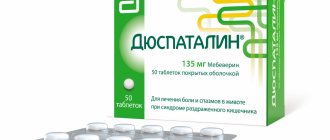Bisoprolol
The effectiveness and tolerability of bisoprolol may be affected by concomitant use of other medications. This interaction can also occur when two drugs are taken within a short period of time. The doctor must be informed about taking other medications, even if taken without a doctor's prescription (i.e., over-the-counter drugs).
Combinations not recommended
Treatment of CHF
Class I antiarrhythmic drugs (for example, quinidine, disopyramide, lidocaine, phenytoin; flecainide, propafenone), when used simultaneously with bisoprolol, can reduce AV conduction and myocardial contractility.
All indications for use of the drug Bisoprolol
Blockers of “slow” calcium channels (SCBC) such as verapamil and, to a lesser extent, diltiazem, when used simultaneously with bisoprolol, can lead to a decrease in myocardial contractility and impaired AV conduction. In particular, intravenous administration of verapamil to patients taking beta-blockers can lead to severe arterial hypotension and impaired AV conduction.
Centrally acting antihypertensives (such as clonidine, methyldopa, moxonidine, rilmenidine) can lead to a decrease in heart rate and cardiac output, as well as vasodilation due to a decrease in central sympathetic tone. Abrupt withdrawal, especially before discontinuation of beta-blockers, may increase the risk of developing “rebound” arterial hypertension.
Combinations requiring special caution
Treatment of arterial hypertension and angina pectoris
Class I antiarrhythmic drugs (for example, quinidine, disopyramide, lidocaine, phenytoin; flecainide, propafenone), when used simultaneously with bisoprolol, can reduce AV conduction and myocardial contractility.
All indications for use of the drug Bisoprolol
BMCC dihydropyridine derivatives (for example, nifedipine, felodipine, amlodipine) when used simultaneously with bisoprolol may increase the risk of arterial hypotension. In patients with CHF, the risk of subsequent deterioration in cardiac contractility cannot be excluded. Class III antiarrhythmic drugs (eg, amiodarone) may worsen AV conduction disturbances.
The effect of beta-blockers for topical use (for example, eye drops for the treatment of glaucoma) may enhance the systemic effects of bisoprolol (lowering blood pressure, lowering heart rate).
Parasympathomimetics, when used simultaneously with bisoprolol, may enhance AV conduction disturbances and increase the risk of developing bradycardia.
The hypoglycemic effect of insulin or oral hypoglycemic agents may be enhanced. Signs of hypoglycemia - in particular tachycardia - may be masked or suppressed. Such interactions are more likely when using non-selective beta-blockers.
Agents for general anesthesia may increase the risk of cardiodepressive effects, leading to arterial hypotension (see section "Special Instructions").
Cardiac glycosides, when used simultaneously with bisoprolol, can lead to an increase in impulse conduction time, and thus to the development of bradycardia.
Nonsteroidal anti-inflammatory drugs (NSAIDs) may reduce the antihypertensive effect of bisoprolol.
The simultaneous use of Bisoprolol with beta-agonists (for example, isoprenaline, dobutamine) may lead to a decrease in the effect of both drugs.
The combination of bisoprolol with adrenergic agonists that affect beta and alpha adrenergic receptors (for example, norepinephrine, epinephrine) may enhance the vasoconstrictor effects of these drugs that occur with the participation of alpha adrenergic receptors, leading to an increase in blood pressure. Such interactions are more likely when using non-selective beta-blockers.
Antihypertensive drugs, as well as other drugs with a possible antihypertensive effect (for example, tricyclic antidepressants, barbiturates, phenothiazines) may enhance the antihypertensive effect of bisoprolol.
Mefloquine, when used simultaneously with bisoprolol, may increase the risk of bradycardia.
MAO inhibitors (except MAO B inhibitors) may enhance the antihypertensive effect of beta-blockers. Concomitant use may also lead to the development of a hypertensive crisis.
Allergens used for immunotherapy or allergen extracts used in skin testing increase the risk of anaphylactic reactions.
The clearance of lidocaine and xanthines (except theophylline) may be reduced due to a possible increase in their concentration in the blood plasma, especially in patients with an initially increased clearance of theophylline under the influence of smoking.
The effect of non-depolarizing muscle relaxants and the anticoagulant effect of coumarins may be prolonged during treatment with bisoprolol.
When used simultaneously with rifampicin, a slight decrease in the half-life of bisoprolol is possible due to the induction of hepatic isoenzymes of cytochrome P450 by rifampicin. Usually no dose adjustment is required.
Non-hydrogenated ergot alkaloids and ergotamine increase the risk of developing peripheral circulatory disorders.
Sulfasalazine increases the concentration of bisoprolol in the blood plasma.
Contraindications
Concor should not be used for the following diseases:
- cardiogenic shock;
- acute heart failure;
- chronic heart failure (CHF) in the stage of decompensation, which requires the use of inotropic therapy;
- sinoatrial block;
- atrioventricular (AV) block of II–III degree in patients without a pacemaker;
- severe bradycardia with heart rate less than 60 beats per minute;
- sick sinus syndrome;
- severe arterial hypotension [systolic blood pressure (BP) below 100 mmHg];
- Raynaud's syndrome or severe peripheral arterial circulation disorder;
- severe form of bronchial asthma;
- chronic obstructive pulmonary disease in severe form;
- metabolic acidosis;
- pheochromocytoma (without simultaneous use of alpha-blockers);
- age under 18 years;
- breastfeeding period;
- hypersensitivity to the components of the drug.
Doses and method of administration Concor
Dosage and method of use of the drug Concor
Concor is taken orally (do not chew or crush) once a day with a glass of water, regardless of meals. But there is a dependence on the time of day. The medicine should be taken exclusively in the first half of the day, that is, you cannot take Concor during the day, evening or at night.
As for the duration of therapy, it is determined by the body’s reaction and the decision of the attending physician.
- Arterial hypertension and angina pectoris
The dose of the drug is calculated taking into account the heart rate and general condition of the patient.
To begin with, Concor is prescribed 5 mg, one tablet per day. Then they go up to 10 mg. And in the treatment of hypertension and angina pectoris, the maximum recommended dose is 20 mg per day.
- Chronic heart failure without signs of exacerbation
Initially, 1.25 mg once a day. If the patient tolerates the dosage well, then it is gradually increased every two weeks to 2.5 mg, 3.75 mg, 5 mg, 7.5 mg and 10 mg.
If the dosage is poorly tolerated, then it should be reduced. The maximum recommended dose is 10 mg per day.
Analogs
When choosing analogues, it is important to understand that each of them has its own indications for use, side effects, contraindications, active substances, etc. It is important to consult a doctor and not change the drug yourself.
Which is better: Concor, Bisoprolol, Coronal?
All of these drugs contain the same active substance - bisoprolol. They have similar contraindications and indications for use.
Bisoprolol is used to treat arterial hypertension, tachycardic heart rhythm disorders, ischemia, heart failure and various forms of arrhythmia. It is considered antihypertensive and lowers blood pressure. Patients whose blood pressure is 90 mm or lower (hypotension) are prohibited from taking Bisoprolol. It is easier to tolerate by patients and there is less risk of complications when taking it. This applies to diabetes mellitus, respiratory tract diseases, and hypotension.
Coronal is a generic drug Concor, that is, it has the same spectrum of pharmacological action as the original drug, but differs in strength. Coronal also reduces pain and blood pressure, improves blood supply to the heart muscle, and normalizes heart rhythm. But Coronal does not have such a noticeable effect on the patient’s heart rate.
Which is better: Concor, Betalok Zok, Betalok or Egilok?
The active ingredient in the drugs Betalok ZOK, Betalok and Egilok is the same - metoprolol.
The effectiveness of Concor and Betaloc ZOK in reducing blood pressure and stopping attacks of tachycardia is the same. The duration of the therapeutic effect lasts more than a day. But only a cardiologist has the right to prescribe Concor or Betaloc ZOK, having studied the risk factors, medical history and individual sensitivity of the patient to the components of the drug.
Betaloc is a medicine for hypertension, angina and heart failure. Today it is considered obsolete. He was replaced by Betalok ZOK.
Egilok, like Concor, is effective for high blood pressure, but since the active components are different, there are differences. Compared to Concor, Egilok acts very quickly (15-20 minutes after taking the tablet), but this means that the duration of the therapeutic effect is not so long. The drug should be taken two to three times a day during or after meals.
Which is better: Concor, Nebivolol or Nebilet?
The drugs have a positive effect on the heart with high blood pressure, chronic heart failure, ischemia, tachycardia, but Nebilet and its almost complete analogue Nebivolol are based on the active component - nebivolol, which is capable of dilating peripheral vessels and reducing cardiac output. This adds to its effectiveness as an antihypertensive agent.
The active substance nebivolol promotes the production of nitric oxide, which relaxes blood vessels for a longer period. Unlike Concor, it does not contribute to the patient’s weight gain. Since nebivolol dilates blood vessels, it acts faster, but the effect does not last long.
Nebilet and differing from it solely in the degree of purification and, accordingly, in price, Nebivolol is also used for hypertension and coronary heart disease. But it is contraindicated in patients with low blood pressure, cardiogenic shock, severe heart failure, diseases of the respiratory system and liver. Not for use by children, pregnant and lactating women. Treatment should not be started if you have diabetes, thyroid dysfunction, psoriasis or in old age. Concor is safer for the elderly, children and patients with breathing problems.
Concor or Sotahexal
The active ingredient in Sotahexal, sotalol hydrochloride, copes well with arrhythmia and lowers blood pressure. Contraindicated for use in patients with hypotension.
Sotahexal can cause side effects in the form of bronchospasms, disorders of carbohydrate and lipid metabolism.
Concor, compared to Sotahexal, is easier to tolerate and more effective for patients suffering from chronic heart failure. Also, Concor has a lower risk of complications. This applies to diabetes mellitus (Sotahexal increases hypoglycemia), respiratory diseases, and hypotension. But Sotahexal is more often prescribed for arrhythmic disorders.
Concor or Anaprilin
Anaprilin is a “veteran” of beta-blockers. Time-tested drug. However, since it affects not only the adrenergic receptors of the heart muscle, side effects and dangerous complications develop much more often when taking anaprilin. Therefore, cardiologists advise using new generation beta-blockers, for example, Concor.
Take care of your heart and blood vessels.
Be healthy!
Side effects
Taking Concor may be accompanied by side effects:
- From the nervous system: increased fatigue, dizziness, headache, sleep disturbances, depression may be observed (especially at the beginning of therapy), rarely - hallucinations (usually mild and disappear within 1-2 weeks), sometimes - paresthesia.
- On the part of the organ of vision: visual disturbances, decreased tear production (must be taken into account when wearing contact lenses), conjunctivitis.
- From the cardiovascular system: in some cases - orthostatic hypotension, bradycardia, AV conduction disturbances, decompensation of heart failure with the development of peripheral edema, at the beginning of treatment - deterioration of the condition of patients with intermittent claudication or Raynaud's syndrome.
- From the respiratory system: in isolated cases - shortness of breath (in patients prone to bronchospasm).
- From the gastrointestinal tract: in some cases - diarrhea, constipation, nausea, abdominal pain, increased activity of liver enzymes in the blood serum (AST, ALT), hepatitis.
- From the musculoskeletal system: in some cases - muscle weakness, cramps, arthropathy affecting one or more joints (mono- or polyarthritis).
- From the endocrine system: decreased glucose tolerance (with latent diabetes mellitus) and masking of signs of hypoglycemia, in some cases - increased TG levels in the blood, potency disorders.
- On the skin: sometimes - itching, skin hyperemia, increased sweating, rash. When treated with beta-adrenergic receptor blockers, hair loss, hearing impairment or tinnitus, weight gain, mood changes, short-term memory loss, allergic rhinitis, and priapism are observed in some cases.
Concor during pregnancy
Reception during pregnancy is limited
Expectant mothers should be extremely careful when choosing certain medications. In the case of Concor, you can take it only if the benefit to the mother’s body is greater than the damage. Concor should not be taken during lactation, since the baby receives bisoprolol and auxiliary components through breast milk. If discontinuation of the drug is not possible, then breastfeeding should be discontinued.
Concor and alcohol
Drinking alcohol with Concor
It is known that when drinking alcohol, blood vessels dilate for a short time, that is, the heartbeat accelerates. True, after a short amount of time the opposite happens - vasospasm. And a sharp rise in blood pressure is not the most pleasant, but also not the most dangerous, thing that can await a patient taking Concor. The instructions directly state that Concor and alcohol are incompatible. The central nervous system is depressed, and the patient’s psychomotor abilities deteriorate. Also, do not forget that the medicine and alcohol will be excreted through one excretory system - the kidneys. This can lead to organ damage, and in some cases functional impairment may develop. Internal bleeding may begin, a hypertensive crisis, pulmonary edema, and vascular collapse may begin. But the worst result of taking Concor and alcohol together is death.
Therefore, doctors strongly recommend that you stop drinking alcohol while taking Concor.







